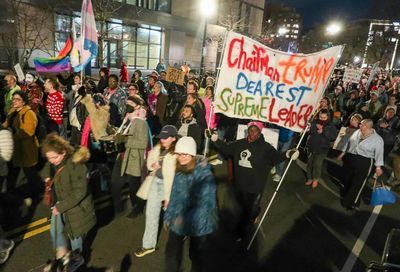9th Circuit Allows Arizona Trans Athletes to Play on Girls’ Teams
Federal appeals court refuses to delay judge's order blocking Arizona from enforcing its restrictions on transgender female athletes.

Two transgender athletes will be able to continue playing on female-designated sports teams following a federal court’s decision not to overturn a lower court order prohibiting the state of Arizona from enforcing its transgender sports ban.
On Monday, the 9th U.S. Circuit Court of Appeals rejected separate bids by Republican legislative leaders and Arizona Superintendent of Public Instruction Tom Horne seeking to delay the effect of a federal judge’s injunction.
U.S. District Court Judge Jennifer Zipps, of the District of Arizona, issued the injunction last month to block the state from enforcing its prohibitions on transgender females who seek to compete on female-designated sports teams while a lawsuit challenging those restrictions moves forward.
Under the law, known as the Save Women’s Sports Act, transgender females are prohibited from competing on sex-segregated sports teams that align with their gender identity, and cisgender students who believe they lost out on athletic opportunities due to the presence of a transgender athlete can sue for damages.
The law also allows for female athletes — both transgender and cisgender, particularly if a cisgender athlete does not conform to traditional stereotypes of femininity — to be subjected to genetic testing to “prove” their gender identity matches assigned sex at birth.
But Zipps found that the law is “overly broad” and may be unconstitutional, violating not only female athletes’ right to equal protection, but Title IX, the federal law that bars discrimination based on sex in educational settings. As such, allowing the policy to be enforced before a final decision on the law’s constitutionality was reached would “irreparably harm” the transgender plaintiffs.
Zipps also found that there was not sufficient evidence to prove that pre-pubertal athletes assigned male at birth hold a significant physiological or competitive advantage over cisgender females, as they have not yet developed secondary sex characteristics. Both plaintiffs in the case — Jane Doe, an 11-year-old cross-country, soccer, and basketball player and Megan Roe, a 15-year-old volleyball player — argue that because they are on puberty blockers and have not yet undergone male puberty, they retain no “unfair advantage” over cisgender female athletes.
Republican state officials, including Horne, Senate President Warren Petersen (R-Gilbert), and House Speaker Ben Toma (R-Peoria) appealed Zipps’ ruling to the 9th Circuit, arguing that allowing either athlete to participate in female-designated sports would be detrimental to cisgender athletes forced to compete against them.
But the federal appeals court rejected those arguments, rejecting the officials’ request that the appeals court “stay,” or delay the implementation of Zipps’ order and allow them to begin enforcing the ban on trans competitors.
In response to the 9th Circuit’s ruling, Horne told the Arizona-based Capitol Media Services he was not alarmed, seeing the ruling — despite its outcome — as one step in a protracted legal fight that he believes will ultimately land before the U.S. Supreme Court, which will rule in favor of the state.
“My view is that this is a first step towards letting males play in female sports in general,” he said. “So this is a long-term fight.”
Petersen criticized the ruling as a form of judicial activism, arguing the 9th Circuit should have allowed Arizona to begin enforcing the law.
“Bad rulings like this are just another reminder why the 9th Circuit is the most radical and overturned in the nation,” he said, echoing well-worn and decades-old GOP talking points.
A spokesman for Toma told Capitol Media Services that the Speaker was “disappointed” by the ruling and would be evaluating his next steps.
In their arguments to the 9th Circuit, Horne has argued that allowing Jane Doe, the 11-year-old cross country athlete, to compete as a girl would inflict “irreparable harm” on cisgender female runners.
“Unless Doe finishes the race behind every biological girl participating in the race, Doe’s participation will necessarily displace a biological girl from finishing in a higher-ranked position,” he argued in court filings. “Those biological girls will be irreparably harmed in the absence of a stay.”
The attorney representing Petersen and Toma argued that state lawmakers have a right to set public policy and adopt laws as they see fit, and that allowing the trans athletes to compete is contrary to the greater public interest.
In her ruling last month, Zipps relied heavily on the assertion that transgender girls are, in fact, girls, acknowledging that some children may have a gender identity that differs from their assigned sex at birth. Part of treating those feelings of gender dysphoria — where a person experiences distress due to incongruence between their identity and their assigned sex — involves social transition and affirmation.
Zipps also argued that forcing either athlete to play on boys’ sports teams would not only cause them distress and exacerbate their gender dysphoria, but could put them at physical risk, especially if they are competing against post-pubertal males with higher testosterone levels — just the same as if they were cisgender girls.
“Assuming there are safety issues created if girls compete with boys, Jane would be subjected to such risks by playing on boys’ teams,” she said, referring to the 11-year-old plaintiff, whose circumstances are identical to those of the 15-year-old plaintiff. “Jane’s medical health depends on her ability to live her life fully as a girl, and playing on a boys’ sports team and competing against boys would directly contradict her medical treatment for gender dysphoria and jeopardize her health. … Jane will also lose the opportunity to receive the physical, social, and emotional benefits that school sports provide.”
Support Metro Weekly’s Journalism
These are challenging times for news organizations. And yet it’s crucial we stay active and provide vital resources and information to both our local readers and the world. So won’t you please take a moment and consider supporting Metro Weekly with a membership? For as little as $5 a month, you can help ensure Metro Weekly magazine and MetroWeekly.com remain free, viable resources as we provide the best, most diverse, culturally-resonant LGBTQ coverage in both the D.C. region and around the world. Memberships come with exclusive perks and discounts, your own personal digital delivery of each week’s magazine (and an archive), access to our Member's Lounge when it launches this fall, and exclusive members-only items like Metro Weekly Membership Mugs and Tote Bags! Check out all our membership levels here and please join us today!
























You must be logged in to post a comment.